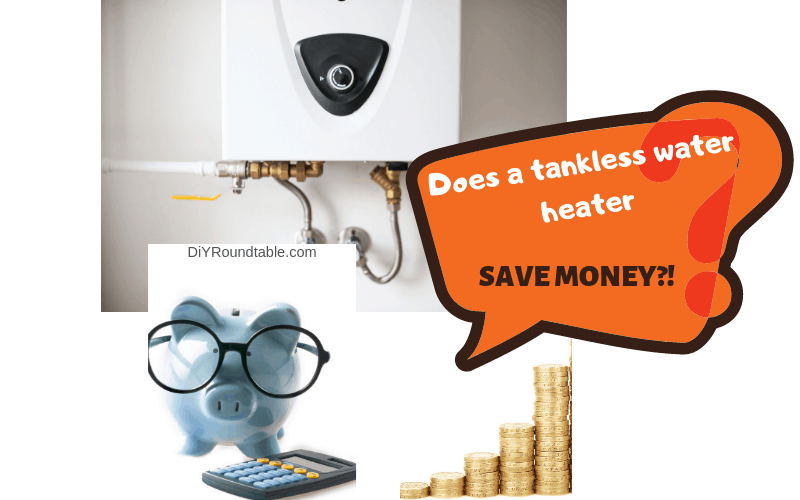This post may contain affiliate links. Please read the disclosure for more info.
During my most recent home renovation, I was short on space in a utility closet in the basement that housed an aging water heater. Before making a purchase, I took time to research the pros and cons of a traditional tank water heater versus a tankless water heater, the costs to purchase and install, the possible savings on energy bills, and the payback period. I have summarized that research to help others determine if a tankless water heater will save money in the long run and be the right choice.
So, does a tankless water heater save money? Yes, a tankless water heater can save money over time, but that doesn’t mean it is always the right choice and there are many factors to consider before deciding.
Consider the average cost of a 50-gallon traditional tank water heater is $500 (or $1000 installed) with an average lifespan of 10 years. The average cost of a tankless water heater is $1300 (or upwards of $3000 installed) with an average lifespan of 20 years. Depending on the household water consumption the average annual savings with a tankless water heater is $100 per year.
This would take almost 10 years to break even on the cost of the unit or longer depending on the installation costs for a tankless water heater.
This scenario would cause the payback period to be close to the life of the unit, however, there are more factors to consider which may sway the decision. Keep reading below to get the information you need before making a costly decision that you may regret!
Jump To:
What do you need to know before buying a water heater?

Before replacing your traditional water heater with a tankless water heater, you need to consider more than just the cost of the unit.
Tankless water heaters save money in the long run, but initial costs are higher than traditional tank water heater models. Traditional tank water heaters cost $500 for a 50-gallon unit, can last up to 10 years and many are direct vent and high efficiency. Tankless water heaters cost around $1300 and can last up to 20 years. The U.S. Department of Energy estimates that a gas tankless heater can save an average of $108 per year in utility bills compared to a traditional tank water heater, while an electric tankless water heater can save $44 per year in utility costs.
These numbers will create a payback period that is not favorable to replacing a traditional water heater with a tankless water heater.
Here is a helpful rule of thumb sizing for a tankless water heater:
For 1 – 2 People, with 1 Bath would require 140,000 BTU’s
For 2 – 3 People, with 2 Bath would require 190,000 BTU’s
For 3 – 5 People, with 3 Bath would require 380,000 BTU’s
Here are the flow rates for common household appliances
Remember : Gallons per minute (GPM) or flow rate is a good indicator to help you choose the right tankless water heater for your household needs!
| Appliances | Gallons Per Minute (GPM) | Temperature of Water (F) |
| Tub | 4.0 | 100° |
| Shower | 2.5 | 105° |
| Sink | 1.5 | 105° |
| Dishwasher | 1.5 | 105° |
| Washing Machine | 2.0 | 120° |
What factors impact the installation costs of a tankless water heater?
On top of the purchase price, the installation costs can vary greatly depending on several key factors, such as:
In an older home, greater than 25 years old, it can be expensive to upgrade to a tankless water heater due to several retrofits to plumbing or upgrades to gas lines.
A tankless water heater instantly heats the water requiring a big draw on gas as the water passes through the unit. This may require older homes to have an upgraded gas supply line from 1/2” to 3/4” which will require further costs.
Plumbing water supply lines may need to be re-routed since the water lines on a tankless water heater are fed from the bottom whereas in traditional tank water heater water lines are fed from the top.
With electrical tankless water heaters, the installation costs can increase if you need to upgrade your home’s electrical system to support the tankless unit.
Based on the unit purchased the installation may require new pipes or new exhaust vents which add to the overall installation costs.
Finally, a tankless water heater will still have a delay in hot water which has been heavily mentioned as a key disappointment for many people. This is due to the fact the water in the lines that is not heated travels through the plumbing lines to the faucet or showerhead resulting in colder water at the spout. A way around this is to have a recirculating pump move the water through the tankless water heater but will add to the installation costs.
All these installation chargers can add many years to the payback period, upwards of 20 years, which is near the life expectancy of the unit, resulting in a tankless water heater not being the right solution for your home.
One option to save money is to replace your current water heater with the exact same unit or comparable unit. The thought here is that traditional water heaters over time develop sediment in the bottom that can cause the unit to perform worse. Buying a new unit will allow for instant efficiency gains.
A smarter choice is to purchase a high-efficiency traditional tank water heater which uses less energy but won’t need the modifications listed above. The unit will cost less and avoid the installation costs that come with the tankless water heaters while still saving money!
What are the Pros and Cons of a Tankless Water Heater?

What are the pros for a Tankless Water Heater?
To make the switch from the traditional tank water heater to a tankless water heater is a big investment for many but consider the decision to be more than just several hundred dollars in annual savings over the life of the water heater. If space is a premium, consider how much less space a tankless water heater will take up compared to a traditional tank water heater. Also, consider if hot water duration is a necessity. A tankless water heater means no more cold showers since the water is heated on demand as the water runs through the unit; meaning the tank will not run out of hot water while you are using it.
Unlike a traditional tank water heater, you cannot deplete the water in the reservoir causing you to have to wait until the water heater produces more hot water.
Unlike a traditional tank water heater, it is much simpler to winterize a tankless water heater. This is a huge advantage for those that have seasonal homes.
What are the cons for a Tankless Water Heater?
A tankless water heater can be if the power goes out you will not have hot water until it returns. Unlike a traditional tank water heater, there is no reservoir to hold the heated water.
Also, you must ensure you have a properly sized tankless water heater for when you have the laundry and showering occurring at the same time you will not see a challenge in the tankless water heater keeping up.
Unlike a traditional tank water heater, a tankless water heater cannot be a source of water for cooking, bathing, drinking if there are power outages, emergencies, water restrictions, or droughts.
What situations are best for a tankless water heater?
There are many factors to consider before buying a tankless water heater and there are several specific situations that do call for a tankless water heater.
A traditional tank water heater heats the water from the within the tank to around 120 degrees Fahrenheit, are bulky and take up a lot of floor space.
A tankless water heater heats the water on demand using gas / electric coils, however, this on demand is not without its limits.
A tankless water heater size is measured by the BTU’s (how fast it will turn cold water hot) and gallons per minute ( measure how much hot water how fast).
Although tankless water heaters heat water on demand, they do have output limits on their flow rate. This means, if you’re running the dishwasher, doing the laundry, and taking a shower simultaneously, your heater may not be able to produce hot water fast enough.
A gas tankless water heater will usually heat water faster than an electric tankless water heater. For example, if the additional installation costs mentioned do not fall within your scenario and you just have the cost of the unit then a tankless unit can be a great way to save money on energy bills.
If you live in a newer community or neighborhood where many existing homes have tankless water heaters you may want to upgrade the homes water heater to stay competitive if you decide to sell the home.
Other situations can require point-of-use tankless water heaters to be installed, such as, in an RV, under sinks, in a tiny home or for washing machines.
Conclusion:
Thanks for checking out the post. Don’t forget to subscribe on social media and add comments below.
Also check out some related articles I have written:

